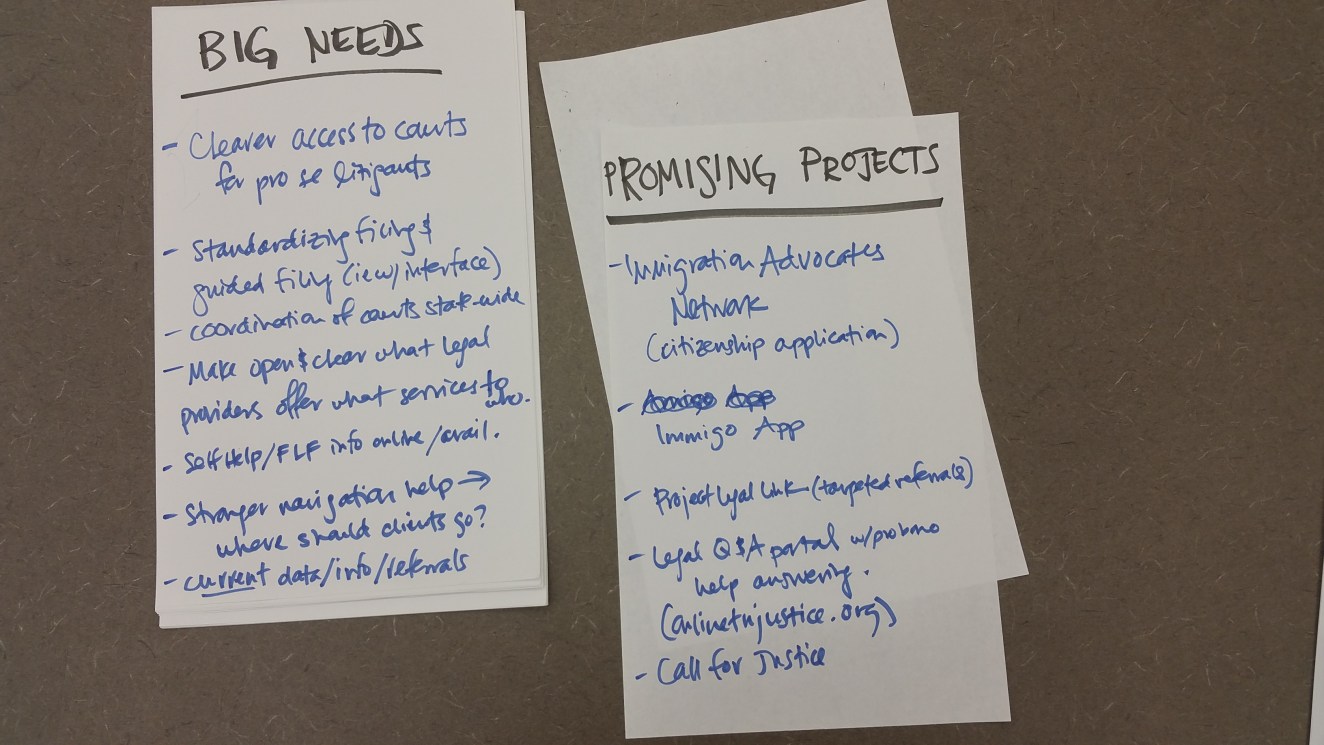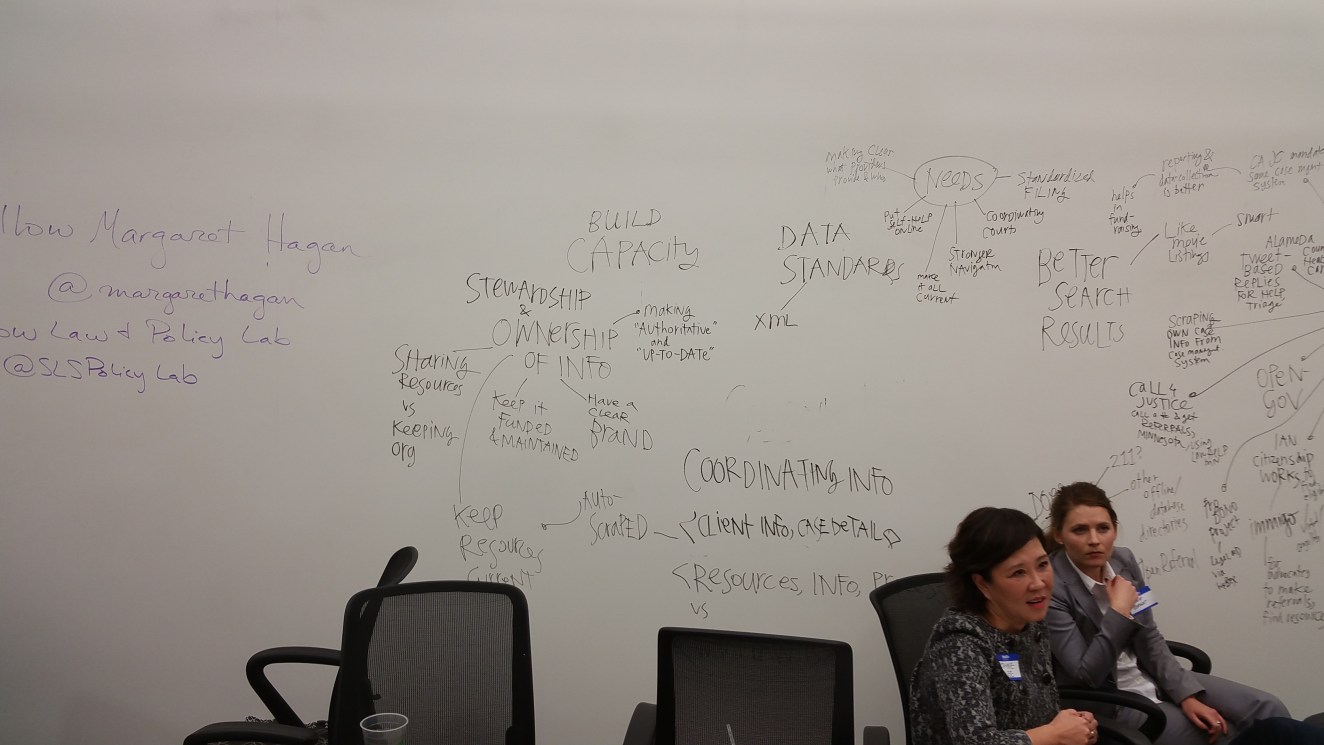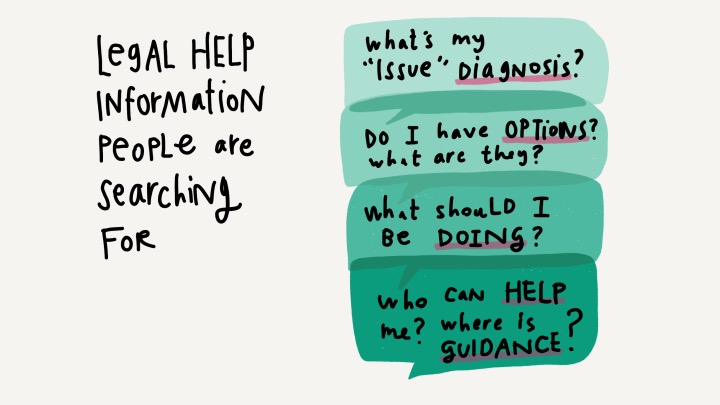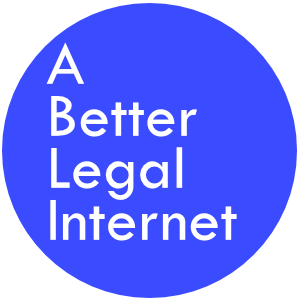
The Internet is not a good place to find legal services.
Even while more people search the Internet to figure out how to respond to a problem in their life, they can’t find clear answers or paths to get to legal solutions.
We at the Legal Design Lab believe there should be a Better Internet for Legal Help. It should be Simple on the Front End, Smart on the Backend.
Smart on the Backend means having an infrastructure of legal guidance and services, with an open, data-standardized, coordinated system of help providers.
Simple on the Frontend means an ecosystem of usable, useful, and engaging tools for people to use, built on top of this infrastructure.
Table of Contents
Better Legal Internet projects
Our Stanford Legal Design team has been working on this initiative since 2015. Please find the specific projects that we have launched as part of this wider initiative. We will update this list of projects as new efforts arise.
Legal Help Online Dashboard
Our team has built a website with extensive best-practices guides, assessments, and resources to build a best-in-class legal help website for people to find and use.
Visit the Dashboard to see comprehensive lists of legal help websites, their rankings, and guides to improving SEO, technical performance, design, and content.

Legal Help Online Cohort
We run a peer cohort of leaders of legal help websites to spread best practices and coordinate strategies. We launched our first Legal Help Online Cohort in November 2021. The cohort helps local leaders to get technical assistance and a supportive community in making their legal help website more visible to people searching for online legal help.

Schema.org markup for Legal Websites
We are working with several legal aid organizations, government agencies, and other technologists and information scientists to develop a standard protocol for using the Schema.org standardized markup for legal help websites.
Schema.org markup allows search engines (like Google, Bing, Yandex, and others) to better identify what content webpages have, and who to show it to. If more legal resources are marked up with Schema.org standards, they can appear higher and more clearly on search results pages. Make your own Schema markup at our Generator tool.
Legal Internet Steering Committee
We convene a quarterly meeting of legal, technical, and community leaders who are interested in improving how the Internet serves people in need of legal help.
Please write if you are interested in attending LISC meetings.

LIST taxonomy of legal issue codes
We have developed the LIST taxonomy of legal problems people experience.
LIST is a new, more user-centered, and machine-readable list of codes. It builds the off National Subject Matter Index, a comprehensive list of legal problems that people in the United States might have. This standard taxonomy is of use in our machine learning project Learned Hands. LIST provides standard issue codes to label people’s stories with. It can also be used by legal help websites, applications, and chatbots to have standard codes to label people’s problems with.
This project is supported by Pew Charitable Trusts and Legal Services Corporation.

Learned Hands labeling game
Learned Hands is an online game that develops a labeled dataset of people’s legal problem stories, to develop AI models to automatically spot legal needs & resources
With our partners at Suffolk Law School’s LIT Lab, we are taking thousands of posts from Reddit’s Legal Advice board, labeling them with our standard issue codes of legal needs, and then using this labeled dataset to develop machine learning models.
This is all on the game Learned Hands that we have built. These models can automatically read through people’s stories about their problems, and identify what legal issues are present.
This project is supported by Pew Charitable Trusts.
Background on Better Legal Internet
1. Our Starting Vision
We began researching people’s use of the Internet to get legal hep in 2015, based on user interviews and design workshops when the issue was repeatedly raised by people we spoke with.
These initial sketches grew out of our early vision, from expert and user discussions.


We need standards for how we present Legal Help online
Open, structured data will provide the foundation for new tools that lay people can use to figure out what services they require (and are eligible for), and how to best access them.
In particular, we will develop standardized, structured data representations that will allow search engines to provide clear guidance on trustworthy, local legal services in response to users who are searching for help with a legal problem. We will also define a systematic agenda of what kinds of tools, interfaces, and services are needed to make this data meaningful to people searching for help online.

2. Why we need to build a Better Legal Internet
As the Internet becomes more pervasive in the way people respond to problems and seek out help, there is an opportunity to transform how most people interact with the legal system. What if, when a person searched Google, Bing, or Yahoo about their problem situation, they were able to find clear ways to:
(1) understand the legal options open to them, and;
(2) find clear, local options to start addressing their problem? What if information about legal services was provided online in a reliable, direct, and interactive way, so that it was more comprehensible and actionable for lay people?
Currently, that is not the case. An Internet search for legal help results in a mix of advertisements for lawyers, general articles about legal topics, and forums where people share their personal experiences. The search results are not often jurisdiction-specific, nor do they provide clear ways to figure out services a person is eligible for, or how to get them. The research we have done at Legal Design Lab has found that people are not able to use the Internet effectively to find and use legal help.
Our project aims to start improving this situation by establishing standards for how legal service providers (including courts, legal aid groups, and others) save and share their data about service options, eligibility, and procedures. If service providers use a standard format and common semantics for their data, it will establish a solid groundwork for a new generation of smarter, powerful technology tools to connect lay people with legal help.
With a coordinated system of standardized data:
(1) search engines could respond to queries by providing clear guidance to local service options,
(2) centralized websites could walk users through eligibility-checks and route them to local service-providers for their needs,
(3) an ecosystem of apps, websites, and other smart tools that can flourish drawing upon this coordinated infrastructure.
3. Original Goals of our Project
Our Lab’s Better Legal Internet project has two main sets of goals, for our work beginning in 2015: the short-term and long-term.
Short term goals:
- Assemble a working group of stakeholders with the expertise to define data standards, and to instantiate them in the context of a specific type of legal service in a limited geography (e.g., family law in California)
- Establish open standards for data, including file formats and semantics (e.g., ontologies) as required
- Generate concepts for tools and Internet search interventions that will use the data standards
Long term goals:
- Internet search results that give clear, reliable guidance to local legal services
- New tools that allow for eligibility-checks, process-guides, and coordinated legal and social service care
- More coordination among social service providers, for improved & holistic care for people in crisis
- Increased participation among social (and legal) service providers in making their resources standardized, machine-readable, and coordinated, and increased funding support from philanthropic foundations
- (and most importantly) A smooth, holistic way for a layperson to go from ‘searching a problem on a search engine’ to ‘finding and following through on a legal process’, all while online.
Working Group round 1: 2015
We brought together key stakeholders from legal service providers, courts, and researchers working on legal service innovation, open data, search, and related topics in 2 summits.
Our first meeting was in November 2015, and it brought together people to scope out problems, opportunities, and specific projects to be done to improve the user experience of legal help online. Some big themes included coherent and interoperable legal portals; data standards and markup of webpages; and more work on the best design patterns and standards for online resources.









This working group began discussions of how a pilot of data standardization for one area of legal services could proceed, and then use that in generating tools and interventions for the general public’s benefit.
In this first summit, we’ve tackled the question of “How can we make the Internet a place for more accessible & user-friendly legal services?” Or, how can we make online legal services “Simple at the Front & Smart at the Back?”
This entailed discussions of both:
(1) “Front-End” tools — tools, websites, and other interfaces that laypeople could be using online to find, understand, and act upon legal information & services
(2) “Back-End” coordination — what legal service providers, courts, and other social service coordinators can be doing together to allow for more comprehensive, coordinated service offerings online

We went through a series of discussions about current initiatives and proposals, brainstorming new initiatives, and refinement to create an agenda for what needs to be happening on both fronts.
We held the session to see if we could find pilot projects or partners among Bay Area actors, for both front-end tool-building and back-end coordination efforts. The push was for exploring how to build a markup schema, to be formed as an extension of Schema.org, that will let existing web content be found, parsed, and delivered better by search engine applications.

The session with stakeholders ended with:
- developing a shortlist for what needs to be improved for a better legal internet: including coordinated data standardization among service-providers, better user-facing tools and platforms, and other coordination of service providers & systems;
- defining what specific pilots we could implement in the Bay Area (or beyond) for a discrete legal issue, to test and gather data about these user-facing tools or back-end coordination;
- soliciting participation from a wider community to support these efforts, and promote the importance of improving the lay person’s experience of finding legal help online.
The first round of work: Semantic Schema.org markup
The primary mission that emerged from round 1 was to develop a Schema.Org extension for legal issues, procedures, and services. This extension should contain markup terms for the content that courts and legal help providers have on their websites.
As more people turn to search engines, like Google, Microsoft Bing, and Yahoo, to figure out what their problems are, and to determine how best to address them, there is an opportunity to provide meaningful, correct, and public information to them about how the legal system might be useful to solving certain of their problems — like around housing, divorce, child custody and support, cleaning a criminal record, or domestic violence.
Schema.org is a standard markup language that Search Engines all rely on, to understand what is on a give website.
- Schema.org markup can be used by groups that provide legal information online (like courts, legal aid groups, statewide legal assistance sites, and others) in order to tag up their information in machine-readable ways, about what issues and services it concerns.
- Our project will create a standard Schema.org markup protocol that can then be used by legal service providers to encode their content, so that there is a standard way to use all of these many possible terms.
- Then search engines and other applications can use this tagged-up information to find the best legal help resources for a specific user and their needs.
- It might also translate into Search Engine results pages giving more real estate or priority boxes to legal help information.

Working Group round 2: 2017
In July 2017, we hosted a 2 day workshop with a wider, national group of people working on a better legal internet to begin experimenting with what a Schema.org legal help extension might be. The goal was to build off our first round of work and priorities with many stakeholders from search engines, legal aid groups, courts, case management system and content management system providers, and data standards experts.
We spent the first day learning the details of Schema.org and its application in other fields from an expert in the markup. We then began working in smaller groups to draft possible markups to common types of offerings on legal aid and court websites, to understand how we might need to create new fields, how we can use existing fields in standard ways, and what use cases or difficulties we should be focusing on.
We finished the meeting with initial drafts of a Schema.org extension for legal help websites, which our Lab team then used to begin the tool on this website to draft information markup.
This meeting also made clear that to capture the issue-specific content on websites, to be able to link Search-users to it — there needed to be a standard way to describe the issues and resources. We discussed whether to create a new ontology of legal issues, or what we could build from. There was a consensus that the National Subject Matter Index was a robust set of terms that could be the starter ontology, but that it might need to be adjusted to be more about people’s problems rather than about service provider’s offerings.















Projects 2017-2020: Learned Hands Schema, LIST Taxonomy, and Search results
From our 2017 working session, we then began to scope out a project that would include working on data standards for issue types through multiple streams of work.
- a refinement of the National Subject Matter Index into the LIST taxonomy, in order that its terms can be clear, human-centered descriptions of the types of resources that legal help sites offer and the types of issues that people are searching the Internet about.
- the development of a Schema.org legal help extension in partnership with experts in this area.
- construction of the Learned Hands game to build a labeled dataset of people’s legal issues
- continued work on what a more usable search results page design would be.
We established a working group in touch over a listserv and found more partners interested in either applying Schema.org markup, using data standards, and working on design solutions.



Developing Machine Learning Models + Needs Analysis of Reddit Stories on Learned Hands
Learned Hands is a web application that Stanford Legal Design Lab built in partnership with the Suffolk LIT Lab and support of the Pew Charitable Trusts.
The app creates a labeled dataset of people’s stories talking about their legal issues. This labeled dataset can then be used to develop machine learning models + a natural language processing classifier that can potentially spot issues automatically in people’s text.
The application lets a crowd of lawyers, law students, and other members of the public to read through people’s stories of possible legal issues (taken from the online forum Reddit/LegalAdvice, where people have given consent and the stories are all anonymized).
Each player’s vote trains machine learning models to automatically issue-spot. As a consensus emerges about whether an issue is present, then the game produces a ‘labeled dataset’ of what issues appear in which problem descriptions. The labeled dataset is a key component to build AI models that can predict whether a certain legal issue is present in people’s stories. It can be an important infrastructure tool for building a better legal internet.
The users read each story, and then label whether certain legal issues are present — is there Family Law issue? Housing law issue? Money and Consumer issues? After classifying the stories at a high level, then users label more specific issues — is there a Divorce issue present? Child custody? Domestic violence?



People are rewarded with points and pro bono credit for their work doing the issue-spotting.

As users of Learned Hands label the posts, the application gathers multiple users’ labels to find if there is consensus of what issues are present in the posts. This then forms a ‘labeled dataset’.
The dataset can then be used to train machine learning models to automatically label text, as to what legal issue is present. Gradually, as the models learn from the labels, they can automatically spot high-level and specific legal issues from people’s stories


Impacts of the project
There are multiple levels of impacts of the project — including of creating a labeled dataset, building issue-spotting models, and analyzing online posts about legal stories.
First, it can create a useful infrastructure tool for making more coordinated, structured legal help online. By making a legal help dataset that is publicly available, it can encourage more people building chatbots and online tools to use standard labels and codes in how they mark up their tools. That means that in the future these tools can better link to each other and hand people from one tool to another.
As Learned Hands has more people use the site, our labeled dataset grows and our machine learning models become more intelligent. This means that we can offer a classifier tool that other websites, chatbots, and online tools can use — so that as people type in emails, chats, or other text — our classifier can help other groups automatically spot issues in them.
This classifier could also be used by other social service groups to spot possible legal issues in their clients’ case notes, to suggest a referral to a lawyer. In the future, we could also have this classifier as a bot on Reddit or elsewhere, to respond to people asking questions about their possible legal issue, by referring them to local legal help websites that have more information and tools for the issue they are discussing.
Our final goal is to create more of an ecosystem around ethical, open AI work for access to justice. We believe that there should be more actors engaging with intelligent, digital help tools, but in responsible and human-centered ways. With this project, we are aiming to do a demonstration of how this is possible.
Projects 2020-2022
In our second round of project work, we have built off our earlier infrastructure to launch more advanced initiatives:
- Legal Help Online Dashboard with detailed audits and guides for administrators of legal help sites
- Schema Markup Generator tool to create legal markup on your help website, so search engines can better find and match it
- Legal FAQ site of eviction help resources, during the Covid emergency
- Legal Help Online Cohort peer group of elgal help website leaders sharing best practices and getting technical assistance
- Legal Internet Steering Committee of quarterly meetings with stakeholders and leaders about big visions and new efforts to improve the legal internet
We also held a large, closed-door event in January 2020 with legal and technology platform leaders on a “Better Legal Internet”. We presented our initial results of our Legal Help Search Audit and workshopped new initiatives to improve search engine results and social media interventions to direct people to local, authoritative legal help.





